Minimally invasive spine surgery for the elderly
Vinmec Phu Quoc International General Hospital has just successfully operated on an 85-year-old patient with lumbar spinal stenosis. This is a difficult case due to old age and many underlying diseases.
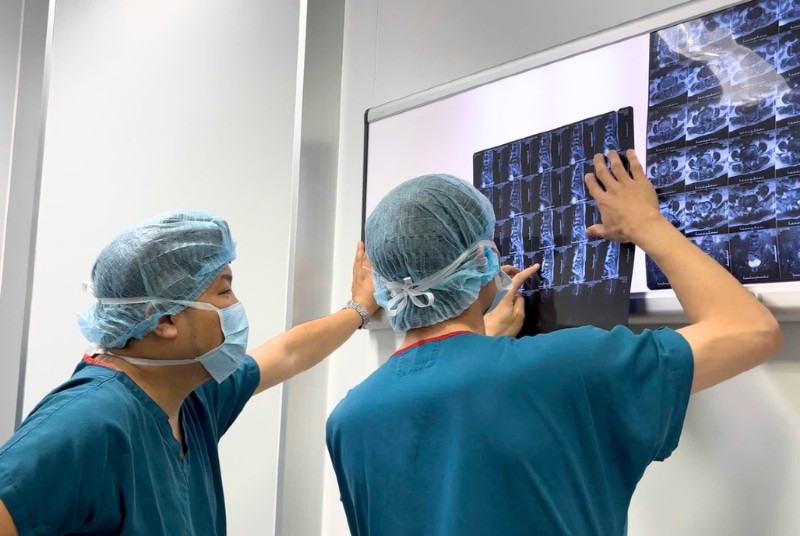 |
| In the elderly, any surgical intervention needs to be carefully evaluated. |
Just one day after surgery, the patient was able to sit up, walk and eat normally, marking a new step forward in the ability to provide intensive treatment at the island's medical facility.
The patient, an elderly woman named NTC, residing in Phu Quoc, was admitted to the hospital with severe back pain that lasted for more than a month, seriously affecting her mobility. She had a history of hypertension, type II diabetes, and ischemic heart failure, making surgery more dangerous.
The results of the examination and imaging diagnosis showed that Mr. C had a narrowed lumbar spinal canal, causing compression of the nerve roots, causing pain and limited mobility. After a thorough multidisciplinary consultation, the doctors decided to intervene using minimally invasive endoscopic surgery to decompress the nerve roots at the L3-L4 vertebrae.
The surgery was successful with a short intervention time, limited blood loss, significantly reduced postoperative pain and no postoperative complications. Notably, after only 24 hours, the patient was able to sit up, walk lightly and live normally, a result far beyond expectations for an elderly patient with a complicated health background.
Endoscopic surgery to treat spinal stenosis is a modern technique, usually only performed at central hospitals. However, at Vinmec Phu Quoc, this method has been routinely applied, helping local people and tourists to access high-quality medical services right on the island, without having to be transferred to the mainland. Endoscopic techniques bring many benefits such as pain relief, shortening hospital stays, limiting risks and are especially suitable for the elderly with many underlying diseases.
According to Dr. Hoang Nguyen Nhat Tan, a neurosurgeon at Vinmec Phu Quoc, for the elderly, all surgical interventions need to be carefully evaluated.
Compared to open surgery which has many potential risks, minimally invasive endoscopic surgery helps improve safety and shorten recovery time. This successful surgery once again affirms that high technology can be effectively deployed at island hospitals like Vinmec Phu Quoc.
The success of the surgery not only opens up effective treatment opportunities for elderly patients with spinal diseases, but also clearly demonstrates the professional capacity and outstanding development of the Vinmec healthcare system in Phu Quoc. This is a testament to the continuous efforts in bringing high-quality healthcare services closer to the community and tourists on the Pearl Island.
Patients escape dialysis thanks to timely treatment and lifestyle changes
A 53-year-old patient, who was prescribed dialysis after a stroke, was lucky to escape dialysis thanks to early detection and timely treatment at Tam Anh General Clinic in District 7 (HCMC).
Mr. L., 53 years old, started dialysis for more than a month at a hospital near his home after being diagnosed with end-stage chronic kidney failure. However, when he went to Tam Anh General Clinic in District 7 to register for dialysis, the doctor there discovered that he was still able to urinate, a sign that his kidney function had not been completely lost. Realizing that there was still a chance to save his kidney, the doctors decided to intervene with intensive medical treatment to delay dialysis as much as possible.
Dr. Do Thi Hang, Head of the Nephrology and Dialysis Unit, said, “We discussed with the patient’s family that there is still hope. If kidney function is maintained, Mr. L. will not have to be attached to a dialysis machine, avoiding costs and improving his quality of life. Delaying or getting off dialysis is an important treatment goal in cases of kidney failure that still have the potential to recover.”
Upon admission, Mr. L. not only had kidney failure but also had a series of comorbidities including long-term high blood pressure, type 2 diabetes, mixed dyslipidemia, hyperuricemia, and ischemic heart disease.
To deal with this complex condition, the medical team has developed a personalized treatment regimen that includes drugs to regulate blood pressure, control blood sugar, prevent atherosclerosis and prevent stroke. Clear treatment goals are set: blood pressure below 140/90mmHg, HbA1c below 7%, LDL-C below 1.8 mmol/L.
Along with medical treatment, Mr. L. strictly adheres to a scientific diet: reducing protein, limiting salt, fish sauce, soy sauce, fatty foods, offal and red meat. He completely stopped drinking alcohol, smoking, did not use painkillers or functional foods indiscriminately, and maintained a moderate lifestyle.
After three months of following the regimen and changing his lifestyle, Mr. L.'s kidney function has improved significantly. The eGFR index, glomerular filtration rate, increased from 24 to 31 mL/min/1.73m², meaning he has moved from end-stage chronic kidney failure to stage 3, no longer needing regular dialysis.
Dr. Hang added that the patient had acute kidney failure on top of chronic kidney failure after a stroke, but was discovered and treated promptly during the golden period. This was a source of happiness for the doctor, the patient, and the family.
Now, Mr. L.'s spirit has returned after months of fighting the disease. He said that, due to the nature of his freelance business with international partners, he often stayed up late, ate irregularly, and consumed fast food and alcohol.
After facing the risk of lifelong dialysis, he was determined to completely change his lifestyle, absolutely not drinking alcohol or smoking, and strictly following a healthy lifestyle as instructed by his doctor.
Mr. L.'s story is also a wake-up call about the state of kidney disease in Vietnam. Currently, there are more than 10 million people with chronic kidney disease, accounting for about 12.8% of the adult population.
Every year, about 8,000 new cases are recorded, mainly related to unhealthy lifestyles. Dr. Hang warns that common habits such as eating salty foods, drinking a lot of alcohol, using processed foods, staying up late, working under stress and being sedentary are silently destroying the kidneys, especially in young people.
Doctors recommend that people should adjust their lifestyle: eat scientifically, increase green vegetables and fruits, limit processed foods, sugary drinks, alcohol and tobacco; at the same time, maintain a regular health check-up schedule every 6-12 months to detect and treat kidney diseases early before it is too late.
Dangerous complications when injecting joints to treat shoulder and neck problems
A 70-year-old male patient in Quang Ninh fell into a state of complete quadriplegia, loss of sensation and acute respiratory failure after he arbitrarily injected himself with medicine to treat neck and shoulder pain at a private clinic of unknown expertise. Despite receiving timely emergency care, doctors said the patient's recovery prognosis was very low, with the risk of permanent disability.
The Emergency Department of the Central Hospital for Tropical Diseases admitted Mr. D.D.B. (70 years old, Quang Ninh) in critical condition with complete paralysis of all four limbs, loss of motor reflexes, loss of sensation, severe respiratory failure and emergency tracheostomy. Although still conscious, he could not breathe or move any limbs.
According to his family, Mr. B. had previously suffered from prolonged neck and shoulder pain but did not go to the hospital for a check-up but instead chose to get painkiller injections at a private clinic of unknown professional qualifications.
After the injection, the condition not only did not improve but also became more severe, with weakness in the limbs, loss of sensation, difficulty breathing, and then rapid paralysis of the whole body and the patient had to be transferred to the emergency room.
MSc. Dr. Le Son Viet, Department of Emergency Medicine, said that the patient was admitted to the hospital in a state of complete quadriplegia, with zero muscle strength, no tendon reflexes, and severe respiratory failure due to respiratory muscle paralysis.
Magnetic resonance imaging (MRI) results showed that Mr. B. had a severe cervical disc herniation at the C2-C3 vertebrae, causing spinal cord compression and leading to widespread cervical myelitis, one of the most serious injuries to the central nervous system.
The medical team immediately coordinated with the Emergency Department and the Department of Orthopedic and Spinal Surgery to perform emergency spinal decompression surgery.
However, the surgery showed that the patient's cervical cord was severely swollen and adhered to the spinal canal wall. At the same time, the patient also showed signs of sepsis and purulent meningitis. It is known that Mr. B. had a history of tuberculosis treatment, leading to immunodeficiency, increasing the risk of widespread infection.
Dr. Nguyen Thanh Tung, Deputy Head of the Department of Orthopedic Trauma and Spinal Neurology, said that although the decompression surgery was successful, the damage to the cervical cord in high areas such as C2-C3 was extremely serious. The ability to recover movement was almost non-existent. Although the patient's life was saved, he was still on a ventilator and the prognosis for his ability to walk and live independently was only about 40%.
Cervical myelitis caused by disc herniation, especially at high positions such as C2-C3, is a very serious and rare neurological disease. According to Dr. Viet, injecting drugs at unlicensed facilities not only poses a risk of infection but also delays proper diagnosis and treatment, causing irreversible nerve damage.
The elderly and people with underlying diseases such as diabetes, chronic lung disease, immunodeficiency, etc. are more susceptible to serious complications.
From the above case, medical experts recommend that people absolutely do not arbitrarily inject, infuse, acupuncture, acupressure or take medicine of unknown origin at medical facilities without operating licenses.
When there are signs such as prolonged neck pain, numbness in the hands, weak limbs or abnormal neurological symptoms, you should go to a specialized neurological or spinal hospital for proper diagnosis and timely treatment.
“If detected early, cervical disc herniation can often be treated conservatively with medication and physical therapy, without necessarily requiring surgery. However, if left too late, damage to the spinal cord, the risk of paralysis and needing a ventilator is very high,” Dr. Tung warned.
At the Central Hospital for Tropical Diseases, doctors have received many cases of late arrivals after treatment with "tricks", which not only makes the disease worse but also wastes the golden time for effective intervention.
“We have seen many patients become completely paralyzed and lose the ability to live independently because of improper painkiller injections. This is an expensive consequence that no one wants to repeat,” Dr. Viet shared.
Source: https://baodautu.vn/tin-moi-y-te-ngay-127-phau-thuat-cot-song-it-xam-lan-cho-nguoi-cao-tuoi-d328519.html



![[Photo] Special class in Tra Linh](https://vphoto.vietnam.vn/thumb/1200x675/vietnam/resource/IMAGE/2025/11/14/1763078485441_ndo_br_lop-hoc-7-jpg.webp)



![[Photo] Deep sea sand deposits, ancient wooden ship An Bang faces the risk of being buried again](https://vphoto.vietnam.vn/thumb/1200x675/vietnam/resource/IMAGE/2025/11/13/1763033175715_ndo_br_thuyen-1-jpg.webp)
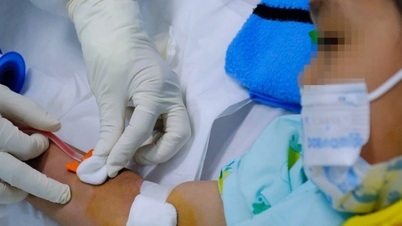

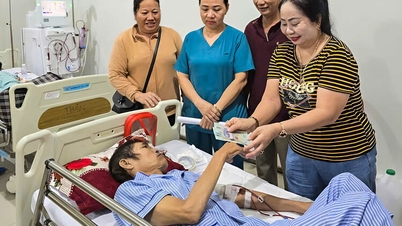



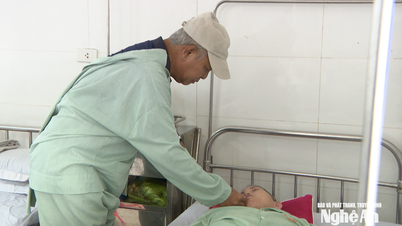



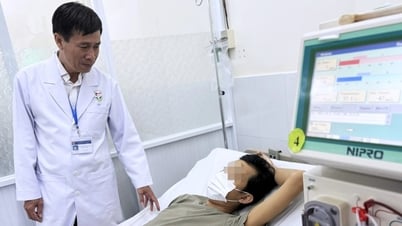






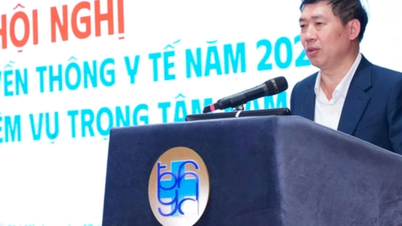























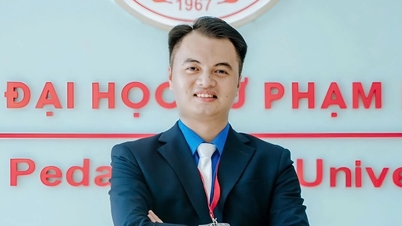





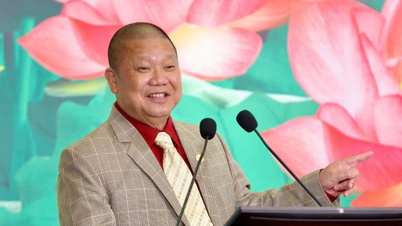








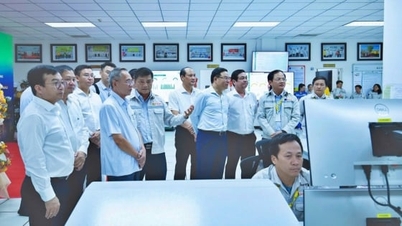












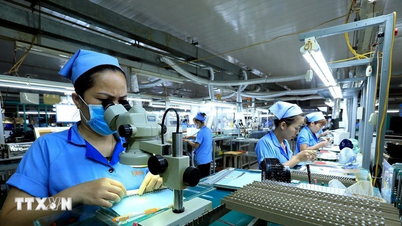



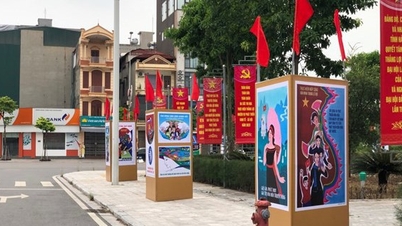






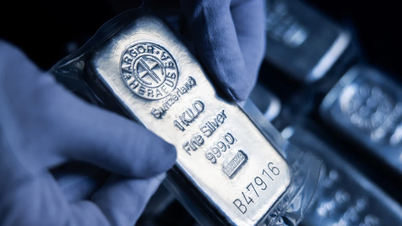
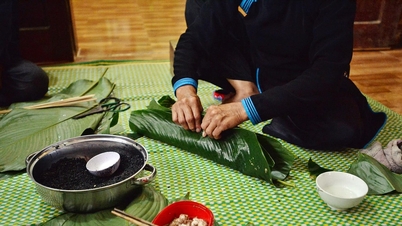

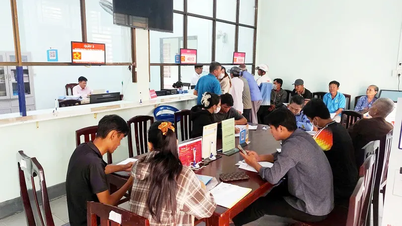




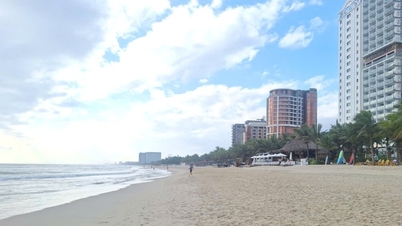







![Dong Nai OCOP transition: [Article 3] Linking tourism with OCOP product consumption](https://vphoto.vietnam.vn/thumb/402x226/vietnam/resource/IMAGE/2025/11/10/1762739199309_1324-2740-7_n-162543_981.jpeg)






Comment (0)